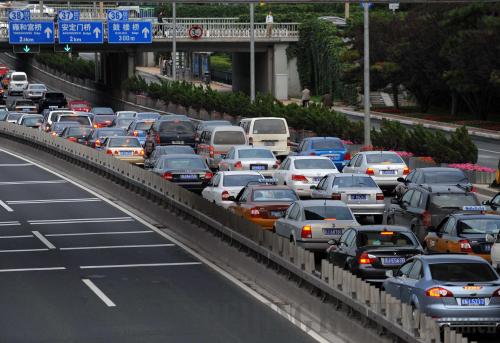|
 |
|
TRAFFIC STALL: Cars move slowly on the North Second Ring Road in Beijing on September 21 (GONG LEI) |
Special Treatment
Before the world's largest electronics contract manufacturer Foxconn opened its new plant in Henan, the province's Education Department issued a notice urging students of local secondary vocational schools to apply for internships at the company. Even though the notice says students can make the decision independently, some schools made it clear students must apply, otherwise their diplomas would be denied.
Clearly, the Foxconn plant will significantly boost Henan's GDP and tax revenue. Therefore, local governments at all levels strongly encourage local laborers to seek employment with the company. For example, the Zhengzhou City Government has formed a special task force to serve Foxconn's needs.
Foxconn is important to the local economy, but it doesn't excuse some local governments from giving privileges to it. For instance, encouraging students to take internships at Foxconn is acceptable, but to issue a special notice and even ask students to take their exams at the company's plant allegedly for minimizing impacts on its production is way beyond a government's duty.
Such favorable policies toward Foxconn will also make it difficult for students to negotiate their salary and insurance, and it is possible they will be treated as cheap laborers.
In the long term, if the government doesn't apply the same rules to big companies as to smaller ones, it will unfairly influence the market and eventually ruin the investment environment.
The Beijing News
Auto Headache
Auto sales in China rose 39 percent from a year earlier to 12 million units in the first eight months of this year, according to the latest statistics of the China Association of Automobile Manufacturers.
China's annual production and sales of new autos were expected to surpass 17 million units this year, said the association.
Fifty-five percent of China's crude supplies are being imported. It's hard to imagine that in such a country, the auto industry is becoming an economic pillar.
The National Development and Reform Commission said that the newly-added 100 million tons of refining capacity in the 11th Five-Year Plan period (2006-10) in China would be totally consumed by new autos.
Obviously, the high-speed growth of the auto industry has become a dilemma in China and brought many social problems, such as severe congestion and environmental pollution.
The government must take action to accelerate the auto industry's integration and to cultivate its own core technology, instead of only dreaming to gain economic benefits from auto production and sales.
Zhujiang Evening News
Inconsiderate Pricing
On October 9, the National Development and Reform Commission (NDRC), China's top price regulator, began to seek public feedback on a progressive electricity pricing plan for households.
Electricity prices for households would be charged in three categories: basic power use, reasonable power use and power use for higher standard lifestyles, according to NDRC's reform program.
Officials said the proposed reform would leave 70 to 80 percent of Chinese households, who consume electricity of no more than 110 kwh or 140 kwh per month, unaffected or slightly affected, as power prices for them would remain roughly the same as before the reform. The other households would have to pay more.
However, applying the 110 kwh or 140 kwh standard nationwide may be unfair since it disregards the development gaps between cities and the countryside and between eastern and western regions.
Therefore, this reform could increase the burden on low-income urban families. Although the absolute electricity prices in China are lower than in the United States, Japan and the EU, the ratio of residents' power spending against their income in China is much higher than that of those countries. This fact should be considered when deciding the benchmarks for different categories.
The Beijing News
Ignored Health Concern
The International Tobacco Control Project recently released a report saying high levels of heavy metals are found in 13 brands of Chinese cigarettes, with some containing three times the level of lead, cadmium and arsenic of Canadian brands. In response, Wang Xiansheng, an official from the State Tobacco Monopoly Administration (STMA), said there has been neither an international nor a national standard on cigarettes' heavy metals content.
Although smoking harms people's health, this doesn't mean that cigarettes don't require safety regulation. However, the quality supervision on cigarettes in China is confined to cracking down on counterfeited products and there have been no safety standards.
Therefore, the report sheds light on China's lack of cigarette safety supervision, toward which STMA officials have held a nonchalant attitude. They said the value of this study was undermined by participants' questionable objectivity, but offered no proof. Meanwhile, the public might question: Are contaminated cigarettes deemed unimportant simply because smoking itself is harmful to health?
When foreign scholars compare Chinese cigarettes and cigarettes produced in their countries and reach a conclusion favorable to their own tobacco industry, it is reasonable to question the study's objectivity. However, the correct way to respond is to organize related agencies to conduct quality tests on Chinese cigarettes and rebut the conclusion with facts and figures instead of turning a blind eye to smokers' concerns. Or they could stop treating this like it's an issue of national pride and instead as a matter of science.
West China Metropolis Daily | 